When prisoners at the Rikers Island jail complex rioted and took hostages in 1975, Commissioner Benjamin Malcolm, 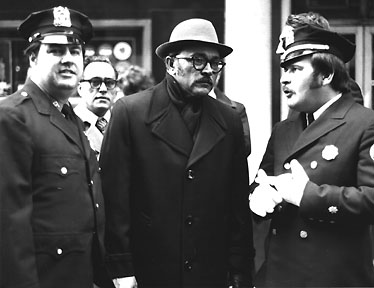 | DOC Commissioner Benjamin Malcolm
gets a situation update in this 1975 photo. |
accompanied by Board of Correction chairman Peter F. Tufo, crawled through tear gas into inmate-held turf, worked out a truce, negotiated the hostages' release, and ended the insurrection. A New York Times editorial declared, "because of the courage of these men, no lives were lost."
The episode was one of the more dramatic in Benjamin Malcolm's correctional services career spanning some four decades. A native of Philadelphia, a graduate of Morehouse College in Atlanta, and a World War II veteran, he started as a New York City Parole Commission officer and advanced through the ranks during the ten years that followed.
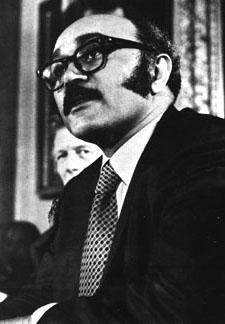 | | With Mayor Lindsay looking on, his appointee to succeed George McGrath as DOC Commissioner, Benjamin Malcolm, speaks at City Hall. |
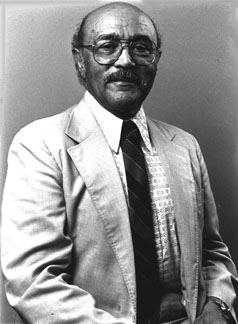 | | This Benjamin Malcolm photo is used in the official display of Commissioners' portraits at DOC headquarters and the Correction Academy. |
The agency he worked for had emerged in 1916 and functioned about a half century. This municipal parole panel made early release decisions on city inmates serving sentences of not more than three years.
But in the mid-1960s, the maximum sentence an inmate could serve in a city jail was set at one year and the panel was discontinued. Longer sentences are served in prisons run by the New York State Department of Correctional Services.
In 1970, Benjamin Malcolm received his master's degree in public administration from New York University. On Dec. 14 that same year, Mayor Lindsay appointed him Deputy Commissioner to Correction Commissioner George McGrath. On Jan. 24, 1972, the Mayor named Malcolm as Commissioner. 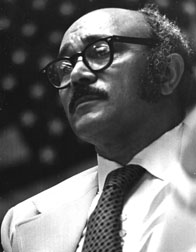 | | With U.S. flag in background, Commissioner Benjamin Malcolm presides over a ceremony in this undated archives photo. |
He thus became the first African-American to head the municipal jail agency. He served until Nov. 19, 1977, when he stepped down to accept appointment by President Jimmy Carter to the U.S. Parole Commission.
His seven years in DOC top management were filled with turmoil, challenges, several innovations and some major accomplishments, including:
- The opening of the Correctional Institution for Women on June 8, 1971, on Rikers Island. The old Greenwich Village "house" was demolished in October, 1973.
- The opening of the Adolescent Reception and Detention Center on May 16, 1973.
- On orders of Federal Judge Morris H. Lasker, the closing the Tombs as housing for detainees in December, 1973.
- The long-overdue closing of the Branch Queens House of Detention for Men in Long Island City in 1975.
- The housing of some city detainees at Ossining Correctional Facility from 1973 to 1976 in response to drug law developments.
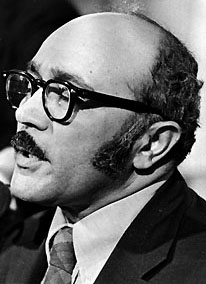 | | Commissioner Benjamin Malcolm argues the case for Correction during one of the various and sundry hearings at which he appeared. |
- The launching of the methadone detoxification program.
- Setting up the nation's first municipal inmate jail councils.
- Installing inmate law libraries in the detention jails.
- Facilitating easier access for outside spiritual leaders to conduct services for inmates.
- Pioneering the use of inmates as suicide prevention aides.
Despite the large issues with which he had to deal, Commissioner Malcolm took time to address individual needs brought to his attention. Among its other tragic consequences, the fatal shooting on Sept.9, 1975, of C.O. George Motchan put in doubt the chances of the officer's son realizing his hopes for medical training to become a doctor, a dream his father shared for him. Malcolm and union leaders worked quietly behind the scenes to bring to appropriate medical school authorities' attention the outstanding qualifications of the young man who, indeed, did win admission and become a highly regarded physician.
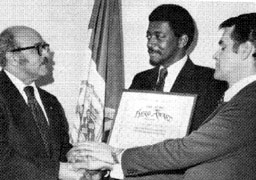 | | Photos from Correction Guardians Association past events. | 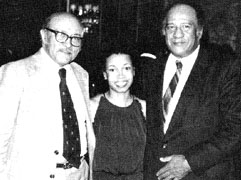 |
In 1984, when Malcolm's term as a U.S. Parole Commissioner expired, New York Governor Mario Cuomo offered him chairmanship of the State Parole Board but he declined, deciding instead to launch a private research company, Parole Services of America, to provide inmates seeking parole with relevant comparative parole data.
In that role, he often traveled around the country, but made his home on Roosevelt Island. Occasionally he would revisit DOC headquarters.
On his most recent visit late last year, he expressed keen interest in the emergence of the New York Correction History Society, noting he had played a part in making some of that history.
Commissioner Malcolm leaves his wife, Susan Whitaker-Malcolm; daughters, Gayle Loftis-Malcolm and Carol Malcolm Buckmann; granddaughters, Dawn and Bentlee; sisters, Ann, Libby and Barbara, and several nieces, nephews and cousins.
Funeral services were held Thursday evening, May 31, at the St. Albans Presbyterian Church, 190-04 119th Ave., Queens. Interment took place Saturday, June 2, 2001 in Rock Creek Cemetery, Washington, D.C.
|